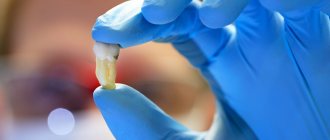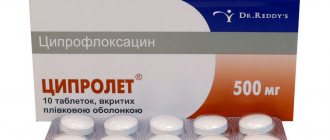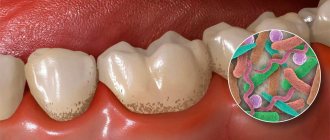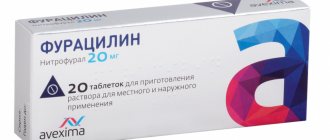The combined drug Novigan quickly eliminates the painful symptoms of algomenorrhea, colic in the stomach and abdominal cavity, and can be used for fever and migraines. The formula of the drug provides improved well-being with cramps, elevated body temperature, and headaches of various origins.
Composition, dosage form
Novigan is available in the form of tablets for oral use: film-coated, packaged in metallized blisters. Each pill contains:
- ibuprofen: 0.4 g;
- fenpiverinium bromide: 0.005 g;
- pitofenone: 0.1 g.
Auxiliary compounds that stabilize the state of the drug and give it shape:
- glycerol;
- talc;
- starch;
- magnesium stearate;
- polysorbate and others.
The secondary cardboard packaging of the medicine contains from 2 to 10 blisters with tablets and detailed instructions included.
The mechanism of action of the drug Novigan
Novigan tablets effectively relieve various types of pain and physical discomfort. The drug is used as an analgesic, antispasmodic and anti-inflammatory. Ibuprofen in its composition provides a blockade of prostaglandins, including those in the peripheral nervous system and tissues of internal organs. At the same time, the substance affects the thermoregulation center, reducing fever and associated discomfort.
Pitophenone hydrochloride is a myotropic antispasmodic that relaxes smooth muscle fibers. Its use helps relieve painful contractions of vascular walls and cavitary organs. Fenpiverinium bromide complements and prolongs its action, having an anticholinergic effect.
The tablet shell quickly dissolves in the stomach cavity, the active substances are absorbed into the blood and distributed in the body fluids, partially binding to plasma proteins. The maximum concentration is usually achieved within 1 hour, and the pharmacological effect develops within 15–20 minutes after administration. The drug is transformed by liver cells, metabolites leave the body along with urine. Residues of the drug remain in tissues and blood for no more than 12 hours.
Novigan has a symptomatic effect, reducing the painful manifestations of pathological conditions. It does not affect the course and causes of chronic diseases.
Novigan, 400 mg+5 mg+0.1 mg, film-coated tablets, 10 pcs.
In recommended doses, Novigan ® does not cause side effects.
From the gastrointestinal tract: NSAID gastropathy (abdominal pain, nausea, vomiting, heartburn, loss of appetite, diarrhea, flatulence, constipation; ulceration of the mucous membrane of the gastrointestinal tract, which in some cases are complicated by perforation and bleeding; irritation or dryness of the mucous membrane membranes of the oral cavity, pain in the mouth, ulceration of the gum mucosa, aphthous stomatitis, pancreatitis.
From the hepatobiliary system: hepatitis.
From the respiratory system: shortness of breath, bronchospasm.
From the senses: hearing impairment: hearing loss, ringing or tinnitus; visual impairment: toxic damage to the optic nerve, blurred visual perception, scotoma, dryness and irritation of the eyes, swelling of the conjunctiva and eyelids (allergic origin), accommodation paresis.
From the central and peripheral nervous system: headache, dizziness, insomnia, anxiety, nervousness and irritability, psychomotor agitation, drowsiness, depression, confusion, hallucinations, aseptic meningitis (more often in patients with autoimmune diseases).
From the cardiovascular system: heart failure, tachycardia, increased blood pressure.
From the urinary system: acute renal failure, allergic nephritis, nephrotic syndrome (edema), oliguria, anuria, polyuria, proteinuria, cystitis, red staining of urine.
Allergic reactions: skin rash (usually erythematous or urticaria), pruritus, angioedema, anaphylactoid reactions, anaphylactic shock, bronchospasm or dyspnea, fever, erythema multiforme exudative (including Stevens-Johnson syndrome), toxic epidermal necrolysis (Lyell's syndrome ), eosinophilia, allergic rhinitis.
From the hematopoietic organs: anemia (including hemolytic, aplastic), thrombocytopenia and thrombocytopenic purpura, agranulocytosis, leukopenia.
Other: increased or decreased sweating.
From the laboratory parameters: bleeding time (may increase), serum glucose concentration (may decrease), creatinine clearance (may decrease), hematocrit or hemoglobin (may decrease), serum creatinine concentration (may increase), liver transaminase activity ( may increase).
If the drug causes a change in your usual condition, stop taking it and call your doctor immediately.
Indications for use
It is recommended to take Novigan for any pain syndrome, including those accompanied by spasms or colic:
- for painful menstruation: active components significantly reduce the production of prostaglandins in the female myometrium, relieve pressure in the vessels of the uterus and appendages, help get rid of cramping attacks before the start of the cycle and throughout menstruation;
- with inflammatory processes in the pelvic and abdominal organs: adnexitis, renal colic, pain in the liver, intestines, gall bladder;
- with cystitis;
- for tension headaches caused by poor circulation due to cervical osteochondrosis, for migraines, and meteosensitivity;
- with myositis;
- with neuralgic syndrome;
- for inflammation and degenerative processes in the joints and spine: arthritis, osteoarthrosis, sciatica, lumbodynia;
- for mechanical injuries of joint structures and muscles: bruises, pinching, dislocations, sprains and torn ligaments;
- during the recovery period after surgical interventions.
If necessary, Novigan can be used to relieve toothache. Ibuprofen in its composition reduces the sensitivity of nerves, reducing unpleasant symptoms.
Novigan
The Indian drug Novigan (ibuprofen + pitofenone hydrochloride + fenpiverinium bromide) is a combined analgesic and antispasmodic drug used for pain syndromes of various etiologies, incl. - for headaches. One of the main tasks of doctors for chronic headaches and pain syndromes of other localization is to choose the optimal drug in a given situation, which, at the same time as being highly effective, would also have a favorable safety profile for single and long-term use. Nonsteroidal anti-inflammatory drugs (NSAIDs) are among the most commonly used drugs to treat pain-related conditions. Recently, the arsenal of NSAIDs has been significantly updated. Combination drugs have appeared on pharmacy shelves, containing, in addition to NSAIDs, two or even three more pharmacologically friendly components. One of the most promising NSAID-containing painkillers is the drug Novigan. It contains the NSAID ibuprofen, the peripheral papaverine-like antispasmodic pitofenone hydrochloride and the mixed (central and peripheral) anticholinergic action fenpiverinium bromide. All active ingredients of Novigan are endowed with different mechanisms of action and enhance the analgesic and antispasmodic effects of each other. Ibuprofen, like other NSAIDs, inhibits the synthesis of prostaglandins, mediators of pain and inflammation. Its anti-inflammatory effect is also realized by stabilizing the cell membrane and specific proteins, suppressing the processes of leukocyte adhesion and phagocytosis, and inhibiting the production of free radicals. The analgesic effect of ibuprofen is stronger than that of propoxyphene and acetylsalicylic acid. In patients with primary dysmenorrhea (menstrual pain in the absence of organic pathology of the genital organs), ibuprofen, by reducing the concentration of prostaglandins in the uterus, reduces intrauterine pressure and its excess tone. In addition, ibuprofen inhibits the formation of thromboxane, which promotes platelet aggregation (sticking together).
Pitophenone hydrochloride, being a papaverine-like substance, acts on the smooth muscle “framework” of the genital organs, promoting muscle relaxation. Fenpiverinium acts in conjunction with pitofenone hydrochloride, relaxing smooth muscles due to the blockade of m-cholinergic receptors. Novigan is quickly absorbed in the digestive tract. The maximum concentrations of active substances in the blood plasma are observed at 2 hours of the drug’s presence in the body. Novigan is excreted just as quickly (its half-life does not exceed 2 hours). If Novigan is taken after a meal, the rate and extent of its absorption is significantly reduced, but this has little effect on the bioavailability of the drug. Novigan is excreted in the urine (more than 90%), and the remainder in the bile. The drug should be taken 1 hour before or 3 hours after meals, and the second option should be considered more successful, because in this case, the irritating effect of ibuprofen on the gastric mucosa is neutralized. According to general recommendations, Novigan is taken 1 tablet up to 3 times a day, with 3 tablets being the maximum allowable dose. Novigan should not be taken for more than 5 days. A long-term medication course using Novigan is possible only under medical supervision, including monitoring of the blood picture and liver and kidney functions. To reduce the risk of negative side reactions from the gastrointestinal tract, Novigan should be taken in the minimum effective dosage. If symptoms of gastropathy appear, the patient should be referred for esophagogastroduodenoscopy and blood and stool tests. During treatment, alcohol consumption should be completely avoided. Concomitant use of Novigan with other NSAIDs increases the risk of side effects from the gastrointestinal tract. Caffeine potentiates the analgesic effect of the drug. When Novigan is used in recommended doses, it does not enter into clinically significant interactions with commonly used drugs.
Contraindications
The use of the drug is prohibited for the following health conditions:
- bronchial asthma;
- hypersensitivity to acetylsalicylic acid and other NSAIDs;
- for disorders of blood coagulation and composition, pathologies of the hematopoietic organs;
- for diseases and dystrophy of the optic nerve, glaucoma;
- gastric ulcer, acute colitis, pancreatitis, gastritis, erosive lesions of the gastrointestinal mucosa;
- with a tendency to internal bleeding;
- in the period after heart surgery, with acute cardiac arrhythmias.
Novigan is also not applicable in the early stages of pregnancy - in the first trimester, and in the last month before childbirth. It is contraindicated for nursing women and children under 14 years of age.
The drug is prescribed with caution to the elderly, patients with diabetes mellitus, angina pectoris, hypertension, renal or liver failure.
Hormonal treatment for endometriosis.
Hormones for endometriosis are an almost obligatory part of treatment. This is physiologically justified, because the disease is hormone-dependent. Its main reason is the excessive production of estrogen in a woman’s body.
The doctor prescribes hormonal treatment for endometriosis to solve the following problems:
- normalization of the secretory activity of the ovaries and pituitary gland;
- prevention of further proliferation of endometrioid tissue.
Artificial suppression of menstruation is the essence of hormone therapy. Under the influence of active substances, physiological rejection of the uterine mucosa does not occur. Foci of its growth outside the uterus do not bleed, and the body recovers.
Other treatments include:
- Simulating menopause. The doctor prescribes hormonal drugs that reduce the level of sex hormones to minimum values.
- Suppression of ovulation. For this purpose, medications that contain synthetic androgens (male sex hormones) are used. These substances block the release of a mature egg from the follicle.
Drug treatment of endometriosis includes several groups of hormonal drugs. The doctor selects a treatment regimen individually, taking into account a number of factors:
- individual characteristics of a woman’s body;
- the patient’s desire to have children in the future;
- presence of contraindications.
It is difficult to cure endometriosis without hormones. Alternative treatment can only be considered as an additional treatment. Its effectiveness is difficult to predict. Further development of the disease and relapse cannot be ruled out.
Hormonal oral contraceptives for endometriosis.
Before determining a treatment regimen, the attending physician prescribes tests to determine which hormones are elevated. Each group of drugs for the treatment of a disease has a different pharmacological effect, so self-medication is unacceptable. The decision on conservative treatment or surgery is made only by a qualified specialist.
Advantages and disadvantages of hormonal treatment for endometriosis
The effectiveness of drugs for endometriosis depends on the stage of development of the disease. The highest therapeutic effect is observed at the initial stages of development of the pathological process. Early detection of pathology helps to avoid surgical intervention. The advantages of this treatment are:
- pain relief;
- stopping bleeding;
- restoration of reproductive function.
Along with the therapeutic effect, hormonal pills for endometriosis have a contraceptive effect. They are prescribed to women in the later stages of the disease as preoperative preparation and during the rehabilitation period. After a course of therapy, the woman’s body quickly recovers: the menstrual cycle normalizes and fertility is preserved.
Hormone treatment, like any other, has disadvantages:
- lack of therapeutic effect if the cause of endometriosis is not associated with an increased level of estrogen in the woman’s blood;
- duration of therapy (from 6 to 12 months);
- drug dependence may develop;
- Do not skip taking medications, otherwise breakthrough bleeding will occur;
- after discontinuation of drugs there is a risk of relapse.
With long-term use of hormones, a woman develops adverse reactions. The most common ones include:
- nausea;
- headache;
- violation of metabolic processes;
- depression;
- dysfunction of the circulatory and digestive systems.
Contraindications to hormone treatment
Not all patients are prescribed hormonal therapy. This method of conservative treatment of endometriosis has contraindications:
- endocrine disorders;
- renal and hepatic dysfunction;
- pathologies of the heart, blood vessels, hematopoiesis;
- diabetes;
- stomach ulcer, gastritis;
- tendency to allergies;
- hypersensitivity to individual components of drugs.
It is not advisable for women who are obese or smokers to take hormones. Contraindications include pregnancy, lactation, and the presence of cancer.
Treatment of endometriosis with hormonal drugs is the most effective way. There are various groups of medications that are prescribed to combat the disease. The drug therapy regimen is selected only by the doctor.
Based on materials from https://gormonal.ru
Side effects
While taking the drug, reactions from the gastrointestinal tract and nervous system are possible:
- loss of appetite, dry mouth, unpleasant taste, nausea, epigastric pain;
- dizziness, insomnia or increased drowsiness;
- decreased urine volume;
- increased sweating;
- visual disturbances;
- increased level of leukocytes in the blood, decreased clotting;
- bronchospasm;
- tachycardia, increased blood pressure.
Possible signs of an allergy to the drug: swelling of the mucous membranes of the eyes and eyelids, lacrimation, urticaria, itching, aphthous stomatitis, vasomotor rhinitis, laryngeal edema. In such cases, immediate discontinuation of the medication is required.
How to use Novigan: instructions
It is recommended to take the drug in short courses: no more than 5 days in a row. The maximum dose of tablets is 3 pieces: 1 three times a day. If well tolerated, Novigan can be taken between meals: 2–3 hours after meals or 1 hour before meals. If you have stomach problems, it is not advisable to take the tablets on an empty stomach. It is safer to take them with food.
Treatment should not be combined with taking tranquilizers, other NSAIDs, drinking alcohol or caffeine-containing products. This may increase side effects and cause intoxication.
What to do if the tooth under the crown hurts?
Orthopedic treatment in dentistry is a complex process that includes many stages. Every action during prosthetics requires professionalism and skills from the doctor. But, unfortunately, sometimes after fixing the prosthesis, the tooth under the structure may become ill. What to do in such a situation?
What to do if the tooth under the crown hurts.
If your tooth hurts immediately after installing a crown, then don’t panic. Such pains
may be a variant of the norm, since the oral cavity is only adapting to the new design. The pain after fixing the prosthesis will go away on its own in 2-3 days. If the pain does not subside, this is a serious reason to contact a specialist again.
But what to do if the crown has been in the mouth for a long time, and the tooth is just starting to hurt? In such cases, you should immediately contact your dentist, because most likely the tooth needs treatment.
Why does the tooth under the crown hurt?
Pain in a tooth under a crown can occur for a number of reasons.
In most cases, before fixing the crown in the tooth, the nerve is removed and the root canals are filled. In this situation, pain may appear for the following reasons:
- Incomplete filling of root canals. If after canal treatment the images show areas without filling material, then the canal is poorly sealed. Over time, this condition can lead to the development of an infectious process at the apex of the tooth roots. This situation occurs especially often in teeth with root canals that are too narrow and curved.
- Removal of filling material beyond the root apex. In this situation, there is too much material in the channel. “Extra” material enters the periodontal space and causes inflammation there, which is accompanied by pain.
- Shrinkage of materials over time. If endodontic treatment was performed many years ago, then there is a possibility that voids have formed in the root canals, which can cause pain.
- Perforation of the canal wall. This is a complication after canal treatment, which is the appearance of a hole in the canal cavity. Such a cavity can cause inflammation and pain.
- Breakage of the tool in the channel during processing. Various small tools can also trigger inflammatory reactions and pain.
In cases where a crown is fixed to a “living” tooth, the following circumstances most often become the causes of pain:
- Development of various forms of pulpitis on natural tooth tissues.
- Burn of the pulp (dental nerve) during the treatment of tooth tissue.
- Incomplete removal of carious tissue before fixing the crown.
In addition, pain in the tooth under the crown may occur for other reasons that do not depend on the treatment tactics before fixation, for example:
- Injury to the gums by the edge of the crown.
- A large amount of plaque in the mouth.
- Development of pathological periodontal pockets in the area of the prosthesis design.
- The appearance of a fistula under the crown.
- Poor fitting and fixation of the crown.
- Overbite overbite with an artificial crown.
- The appearance of mobility in a tooth with a crown.
There are other situations in which the tooth under the crown may hurt.
Only a dentist can find out the real cause of pain, as well as eliminate all unpleasant symptoms. You can make an appointment with a specialist at the dental clinic “Dentist” by calling
:
+7
+7(903) 961-85-87
Symptoms of inflammation of the tooth under the crown.
Inflammation of a tooth under an artificial crown is a serious dental problem, which may be accompanied by the following symptoms:
- Constant severe pain in the tooth indicates the development of acute periodontitis.
- Pain that appears when biting on a tooth is a sign of exacerbation of chronic periodontitis.
- Spontaneous pain with pain-free intervals is a symptom of tooth pulpitis (in cases where a “living” tooth is covered with a crown).
- Inflammation of the gums under the crown indicates the appearance of gingivitis or periodontal disease. This situation can arise when the gums are injured by the edge of the crown.
- The appearance of flux on the gum under the crown is a symptom of chronic periodontitis.
Of course, it is impossible to establish a diagnosis based on complaints alone. Therefore, after a conversation and examination of the oral cavity, the dentist will conduct an x-ray examination. It is the image that will help determine the pathology and draw up the correct treatment plan.
Relieving pain at home.
“The tooth under the crown hurts – what should I do?” — most patients ask this very question. Applying lard to a sore tooth, rinsing the mouth with herbal decoctions, chewing garlic and other folk recipes will not relieve a person from toothache.
What exactly cannot be done if the tooth under the crown hurts?
- Warm the area of inflammation. An increase in temperature in the area of the diseased tooth will lead to increased proliferation of microbes and increased inflammation.
- Take antibacterial medications unless prescribed by your dentist. Uncontrolled use of antibiotics will not only not save you from inflammation, but can also worsen your overall health.
- Try to unfix the crown yourself. If you remove it yourself, you can injure the hard tissues of the tooth, as well as damage the artificial structure.
- Take a horizontal position. Lying down will make the toothache worse.
Experts unanimously say that in order to relieve symptoms, it is important to treat the cause of their occurrence with a dentist. But some patients are so afraid of people in white coats that they do not lose hope and look for traditional recipes for toothache on the Internet, wasting precious time and aggravating the situation. Unfortunately, toothache does not go away on its own.
So, if the tooth under the crown begins to hurt, you should immediately make an appointment with the dentist. To temporarily relieve toothache, you can take a painkiller.
When you need urgent medical help.
Tooth pain is always a very unpleasant symptom that can disrupt a person’s plans. But how do you know which toothache requires immediate contact with the dentist?
If the artificial crown is only fixed, then aching toothache and slight swelling of the gums are a normal reaction of the body in response to prosthetics. Such symptoms will go away on their own in 3-5 days. During this time, it is important to provide good quality dental care every day, as well as take pain medication if necessary.
If an artificial crown has been fixed for a long time, but pain has only appeared now, this is a serious reason to contact a specialist. In this case, you may suspect inflammation of the gums, destruction of dental tissues or deformation of the prosthesis, etc. Only a dentist can cope with any of these situations.
Treatment methods.
All methods of treating a tooth under a crown can be divided into surgical and conservative.
Surgical treatment methods are aimed at removing the source of inflammation through the following manipulations:
- Removal of a diseased tooth along with a crown. In this case, you should seriously think about further implantation or prosthetics with removable or non-removable structures from an orthopedic dentist.
- Resection of the apex of the tooth root with a focus of inflammation.
- Hemisection of a tooth is the removal of half a tooth with a root that cannot be treated.
Of course, in all these cases it will be necessary to remove the artificial crown and, after the operation, make a new orthopedic structure for the tooth.
Conservative treatment methods are aimed at preserving the tooth in the oral cavity.
How to treat a tooth with a crown.
Each case of tooth pain is individual and therefore requires a strictly personalized approach. To decide on treatment tactics, the doctor will talk with the patient, conduct an examination of the oral cavity and perform an x-ray examination.
There are several options for treating a tooth under a crown:
- Carefully remove the crown, treat the tooth and fix the crown in its original place. Unfortunately, it is quite difficult to treat a tooth in this scenario. When removing a crown, there is a huge risk of deforming it. In addition, even if the crown is removed carefully, the tooth may change its shape after treatment, so fixing the old crown will be problematic.
- Treatment of a tooth through a hole in the crown. The doctor makes a hole in the artificial crown to provide access to the root canals. In this case, the crown remains on the tooth, but its surface is slightly deformed. After the treatment, the hole in the crown is restored with a composite.
- Crown removal, tooth treatment and making a new artificial crown. In this case, the doctor has all the conditions to carry out high-quality dental treatment.
You can remove the crown in the following ways:
- Sawing the crown using dental burs. The procedure is painless for the patient, but requires extreme care from the doctor.
- Removal of crown using ultrasound. In this case, ultrasonic waves break the material on which the crown was fixed. Unfortunately, the technique does not work with all classes of dental cements, so sometimes it is ineffective. Hardware crown removal. Special removal tools may be used to remove the crown.
What to do if the crown on a diseased tooth is part of a bridge?
In this case, most often you have to remove the prosthesis. This leads to the loss of several teeth at once.
The orthopedic dentist tries to preserve the prosthesis during treatment and restore the affected tooth so that the structure can be fixed in its original place. Often these manipulations cannot be performed, so a new “bridge” needs to be made.
Prevention.
You can prevent the appearance of unpleasant symptoms after installing a crown if you entrust the prosthetics to experienced doctors. The professionalism of the orthopedic dentist who performs prosthetics is the key to long-term use of an artificial crown. For comprehensive, effective, fast and painless orthopedic treatment, you can contact the Dentist dental clinic.
To prevent toothache, it is important to regularly and thoroughly perform oral hygiene at home, as well as visit a dentist for preventive examinations at least once every six months.
What happens if you ignore warning signs?
Can a tooth go under a crown on its own? Unfortunately, any toothache will not go away unless its cause is eliminated. In addition, if you ignore alarming symptoms, you can aggravate the course of the disease and allow the development of complications.
That is why, if you experience toothache under a crown, you should immediately make an appointment with a dentist.
Why should you contact Dentist?
Installing a crown on a tooth is a complex multi-step process that requires a doctor to
professionalism and skills, and from the patient - patience and time investment.
In order for an artificial crown to delight you with its beauty and functionality for many years, it is important to take a responsible approach to choosing an orthopedic dentist. First of all, this must be a specialist with clinical experience who has the skills to work according to modern protocols. We invite you to visit the Dentist dental clinic, which is located in the very heart of the capital. Our advantages:
- An integrated and individual approach to the patient’s problem.
- A team of specialists with extensive experience.
- Application of the most advanced treatment protocols.
- Implantation according to a strictly surgical protocol.
- Painless, high-quality procedures.
- Modern equipment and materials.
- Honest and transparent pricing policy.
- Possibility to make an appointment at any time convenient for you.
- Convenient location of the clinic in the center of Moscow.
- Pleasant clinic atmosphere and friendly staff.
- Carrying out various promotions, introducing profitable offers for popular areas of treatment.
You can make an appointment with a specialist at the dental clinic “Dentist” by calling
:
- +7
- +7






